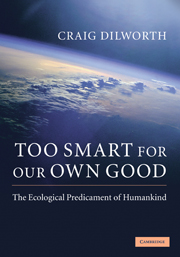Book contents
- Frontmatter
- Contents
- List of figures and tables
- Preface
- Introduction
- 1 Scientific ground rules
- 2 The new views in anthropology, archaeology and economics
- 3 Theoretical background to the vicious circle principle
- 4 The vicious circle principle of the development of humankind
- 5 The development of humankind
- 6 The vicious circle today
- 7 … and too dumb to change
- Conclusion
- Glossary
- Notes
- References
- Index
7 - … and too dumb to change
Published online by Cambridge University Press: 25 January 2011
- Frontmatter
- Contents
- List of figures and tables
- Preface
- Introduction
- 1 Scientific ground rules
- 2 The new views in anthropology, archaeology and economics
- 3 Theoretical background to the vicious circle principle
- 4 The vicious circle principle of the development of humankind
- 5 The development of humankind
- 6 The vicious circle today
- 7 … and too dumb to change
- Conclusion
- Glossary
- Notes
- References
- Index
Summary
The fundamental problem as regards the continuing existence of the human species is that, while we are ‘smarter’ than other species in our ability to develop technology, we, like them, follow the reaction, pioneering and overshoot principles when it comes to dealing with situations of sudden, continuous or great surplus. In keeping with this, and also like other animals, we are not karyotypically built so as to care about coming generations, other than those with which we have direct contact. As Georgescu-Roegen says, the (rat) race of economic development that is the hallmark of modern civilisation leaves no doubt about humans' lack of foresight. Even if made aware of the entropic problem of the human species, humankind would not be willing to give up its present luxuries in order to ease the life of future generations. When problems arise we turn to the nearest solution to hand, and do not take into account the long-term consequences of our actions. In this regard we act irrationally. We humans, in whatever situation, will gladly use irreplaceable resources to produce a technological fix if it fills an immediate need. The longest we are prepared to put off gratification is perhaps a year, where in certain societies, though people may be dying of starvation, seeds are saved for the next year's planting.
- Type
- Chapter
- Information
- Too Smart for our Own GoodThe Ecological Predicament of Humankind, pp. 393 - 452Publisher: Cambridge University PressPrint publication year: 2009

